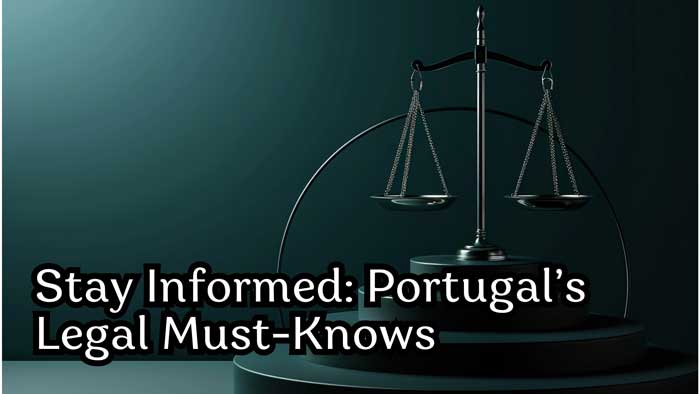Starting a new life in Portugal can be both exciting and challenging. Between learning the language, exploring the country, and adjusting to a different culture, there’s a lot to take in. But alongside these discoveries comes something equally important: understanding the rules that shape daily life.
In Portugal, as in most countries, the law plays a quiet but constant role. It influences how we live, work, rent homes, access healthcare, and interact with public services. It sets the framework for what is allowed, what is required, and what is protected.
Why It Matters to Know the Law
There’s a saying in Portuguese law: A ignorância da lei não desculpa ninguém. It means that not knowing a law doesn’t exempt you from following it. If you break a rule — even by accident — you may still face consequences. That’s why it’s essential to understand at least the basics. Simple knowledge can help you avoid mistakes, protect your rights, and stay informed.
But legal awareness isn’t only about avoiding fines. It’s also a way to protect yourself and your family. If your boss doesn’t pay you fairly, if your landlord breaks the terms of your rental agreement, or if you face discrimination, the law can be a powerful ally. Knowing what’s legal and what’s not allows you to react appropriately, ask for help, or file a complaint when necessary.
For many people, the law feels distant—something reserved for lawyers or government officials. But in reality, it’s something we deal with every day. When you rent a flat, sign a work contract, enrol your child in school, renew your documents, or go to the health centre, you’re navigating legal territory. Understanding the basic principles behind these systems can make your life much easier.
Knowing the law can also make you feel more at home. It gives you the confidence to engage more actively in your community. You might discover you have the right to vote in local elections, join residents’ associations, or participate in school councils if you have children. It helps you feel not just like a visitor, but like someone who truly belongs.
And while the idea of studying the law may sound intimidating, it’s often simpler than expected. You don’t need to read official codes or study legal jargon. Today, there are many resources — written in plain language — that explain what you need to know.
There are also plenty of free and public resources available. You can get help from local immigrant support centres, ask questions at your parish council (Junta de Freguesia), or check government websites like Segurança Social or SNS. There are even organisations that provide free legal support, often in multiple languages. Knowing where to turn can be just as important as knowing the rules themselves.
Legal knowledge also prevents common problems. Many people, for example, accept informal work without a contract — without realising that this leaves them without social protections, such as sick leave or unemployment benefits. Others rent homes without written agreements and are then surprised when they’re asked to leave with no notice. Some fail to renew residence permits on time and are shocked by the fines. These situations are avoidable when you understand the obligations involved.
Finally, learning about the law helps reduce anxiety. It’s normal to feel insecure when you’re not sure how things work. But once you begin to understand your rights and responsibilities, you gain confidence. You know what questions to ask. You’re not afraid to speak to a landlord or a public official. You know where to go when something goes wrong.
Understanding the legal system is part of becoming truly integrated. It’s not about memorising rules, but about recognising how society is structured, how systems work, and how you fit into them.
Our book “Leis de Portugal – guia prático”
Now, let’s take a closer look at the guidebook Leis de Portugal – guia prático, developed by Escola Caravela. The book was designed specifically for people who are learning Portuguese and want to better understand how life works in this country — from a legal point of view.
The book is written in clear, accessible Portuguese at B1 level, and it focuses on real-life situations. It’s not a legal manual, and it doesn’t expect the reader to have any background in law. Instead, it’s a practical tool that helps people navigate the Portuguese legal system in everyday life — with simple explanations and plenty of useful examples.
One of the first themes covered is the idea of rights and responsibilities. Readers are introduced to the basic rights guaranteed to everyone living in Portugal, such as access to healthcare, education, housing, and fair working conditions. At the same time, the book reminds us that rights come with responsibilities, including paying taxes, respecting others, and obeying the law. Most of these rights and duties apply equally to foreigners and Portuguese citizens, with only a few exceptions, such as voting in national elections.
The book then moves on to the topic of housing — a subject that touches almost everyone. It explains how rental agreements work, what a security deposit (caução) is, and why it’s important to have everything in writing. Tenants learn what their rights are, such as the right to privacy and safe living conditions, and what to do if a landlord acts improperly or threatens eviction. These explanations are especially valuable for people who may not yet be familiar with the local housing market.
There’s also a chapter dedicated to work and social security. Whether you’re already employed or still looking for a job, it helps you understand the different types of contracts, your rights as a worker, and how the social security system works in Portugal. The guide explains the basics of maternity and sick leave, holidays, and payslips, and it also provides guidance for self-employed individuals. One important message is repeated throughout: working without a contract leaves you unprotected in many ways.
Healthcare is another key topic. Portugal has a public system known as SNS (Serviço Nacional de Saúde), and the guide walks you through how to register, how to book appointments, and what services are free or require a small fee. It also explains how to access care if you don’t have up-to-date documents, and it highlights special protections for pregnant women, children, and people with limited income.
Education is presented as a right that applies to all children in Portugal — regardless of immigration status. The book explains how to enrol your children in school, what age attendance is mandatory, and what kind of support is available, such as free meals, school books, and transport. There’s also information about adult education opportunities, from language courses to vocational training.
The guide includes a section on equality and non-discrimination. It makes clear that no one should be treated unfairly because of their nationality, gender, religion, sexual orientation, disability, or age. Readers learn how to recognise discrimination, what their rights are, and where to go for help. This part also highlights Portugal’s legal commitment to inclusion and human rights.
Another practical section focuses on residence permits, visas, and citizenship. It outlines the different types of legal status for foreigners, how to renew documents on time, and how to start the process of applying for Portuguese nationality. It also explains the changes brought about by the end of SEF (Serviço de Estrangeiros e Fronteiras) and the creation of AIMA, the new agency for immigration and mobility.
Safety and justice are also covered. The book explains how to contact emergency services, what to do if you are a victim of violence, and how small legal disputes can be resolved through local courts like the Julgado de Paz. There’s also practical advice on how to access free legal support.
The final section encourages readers to participate in their local communities. Even if you’re not yet a citizen, you can still take part in neighbourhood associations, school boards, or local initiatives. In some cases, you may even be able to vote in municipal elections. The message is clear: being informed and involved helps you feel truly part of the society you live in.
Conclusion
Leis de Portugal – guia prático is not just about rules and regulations. It’s about helping people live with confidence and dignity. By explaining complex topics in simple language, it gives readers the tools to understand their rights, avoid problems, and build a more stable life in Portugal.
If you’re learning Portuguese and want to understand more about how the country works, this book is an excellent place to start. You can find it at Talk Caravela.com , where we also offer other practical resources for life in Portugal.

